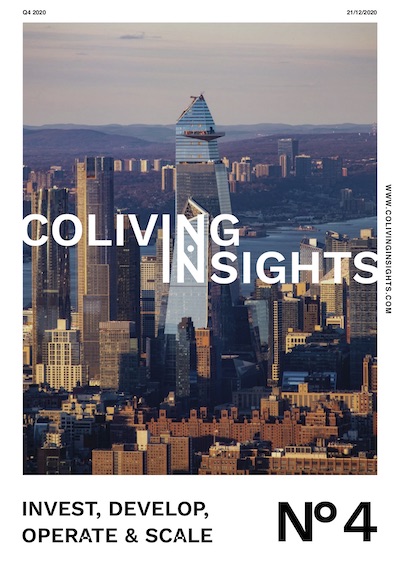Coliving as an investment opportunity
As investing in coliving is still quite misunderstood, we wanted to share some insights about the coliving investment ecosystem and the demand and growth of the coliving sector to date.
To learn more about the different actors involved in the coliving development and investment ecosystem to date, you can read ULI & JLL’s European Coliving Best Practice Guide.
You can also read Coliving Insights No.4: Invest, Develop, Operate & Scale, to better understand the coliving life cycle and actors involved in investing in shared living schemes.

The demand (and supply) for coliving is growing
- JLL’s European coliving database tracks schemes of 20 beds or more and counts 24,500 operational units as of the second quarter of 2022, with a further 70,500 in the pipeline (planned and under construction) across 17 different European countries (JLL / ULI, 2022).
- Coliving is growing rapidly in economically prosperous cities with housing shortages, with the Millennial demographic the key target market of most coliving operators (JLL, 2019c)
- Millennials make up the largest demographic worldwide (Knight Frank, 2018)
Investment in coliving continues to grow
- 51% of European investors plan to invest in Co-living over the next 3 years (Savills, 2023)
- Respondents in a Savills Investor Survey confirm they will be investing up to €2.6bn of capital in coliving assets over the next 3 years (Savills, 2023)
- Adam Neumann launches Flow, with a $350 M backing by a16z and more than 3,000 apartment units purchased in the US (a16z, 2022)
- Cohabs raises $450 milion and gets backed by three institutional investors: global real estate investor Ivanhoé Cambridge, Belfius Insurance, and SFPIM, the real estate arm of the Belgian Sovereign Fund (The Real Deal, 2022)
- US investment manager Ares Management backs the expansion of French coliving operator Colonies with up to €1 billion (Colonies, 2022).
- In June 2020, Ivanhoé, Bouwinvest and Greystar launched a €1 billion coliving investment joint venture that will target acquisitions of new coliving developments, including ground-up developments and projects already under construction (Invanhoe Cambridge, 2020)
- DTZ Investors and The Collective launch COLIV – the world’s first institutional coliving fund. (DTZ, 2019) *Since the administration of The Collective, this fund is backing Folk Co-living, in partnership with DTZ, urbanbubble and Halcyon.
Coliving has proved to be COVID-19 resilient
- Coliving has been reported to be a resilient asset class during lockdown (Cooper, 2020; Brown, 2020; McDannell, 2020), even outperforming traditional multifamily (Common, 2020, Cushman & Wakefield 2020)
- During lockdown, there were reports of the sense of community in coliving being regarded as a highly positive factor by residents (Armstrong, 2020; Birch, 2020; Cottica, 2020). The coworking / communal areas with coliving also facilitate working from home
- Research indicates that a person can reduce his/her exposure to other individuals by more than 95% when living in coliving spaces, compared to when taking a typical daily commute (Ikink et al., 2020)
Alternative forms of real estate investments
- The Social Hub secures €145 million in social and environmental impact financing from UniCredit for Rome and Florence expansion (The Social Hub, 2022)
- The impact investing market is worth over $502 billion, which comprises investments made with the intention to generate positive, measurable social and environmental impact alongside a financial return (GIIN 2019).
- Purpose driven real estate investors and impact investors are getting interested in the coliving sector, as the alternative asset class can provide social, economic and environmental impact. Investors such as FORE Partnership and Bridges Israel Fund have invested in impact-driven coliving companies like Mason & Fifth and Venn.
- According to research from both the Harvard Business Review and the Financial Times, sustainable companies and investments are more likely to outperform companies that do not have corporate sustainability strategies.
Doing good business makes great business sense
The (triple) bottom line here is that doing good business makes great business sense. The CEO of Blackrock, the world’s largest private equity firm, has declared over the years that climate risk is investment risk. Most recently, Blackrock stated it could vote against company directors that fail to provide credible climate plans and is pushing its investees to become net-zero. That said, we believe that:
coliving businesses
have the responsibility and opportunity
to invest in their stakeholders to create communities
that support profit, people and the planet!
This has a direct implication on business models. You can explore further in the Coliving Business Model guide and the Coliving Research page.
Read more about coliving impact measurement and also dive into all things social value in our Coliving Blog article: ‘Social value in Coliving: Embedding social, environmental and economic impact in coliving‘.
Coliving Investment Support
As one of the most well connected and knowledgable players in the coliving industry, Conscious Coliving is uniquely positioned to:
- Connect you with investment opportunities, property owners and real estate deals
- Offer industry connections and insights
- Support with the development and operations of your assets
Although growing rapidly, coliving is still a relatively small industry and an insider’s perspective is crucial to identifying the best investment opportunities.
Reach out to us below to learn more about how we can support you with these services and better understand the coliving investment ecosystem.
Book a Conversation about Coliving Investment
Would you like to explore working with us? Let’s have an introductory conversation about coliving investment.
In this call, we will explore:
- A deeper understanding of what you want to achieve
- Where you and your team need support
- Your timeline
- What working together would look like
